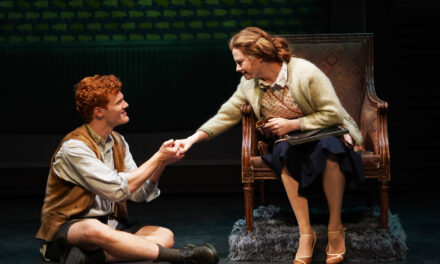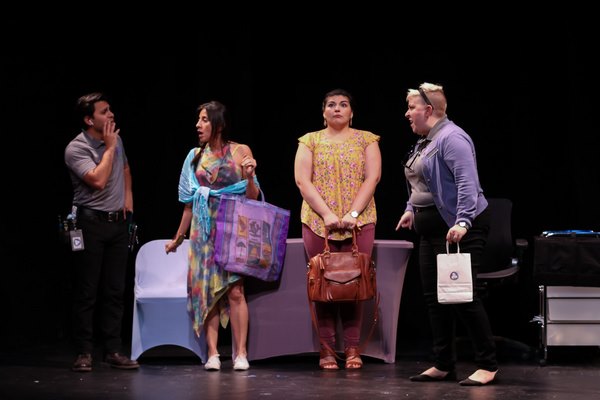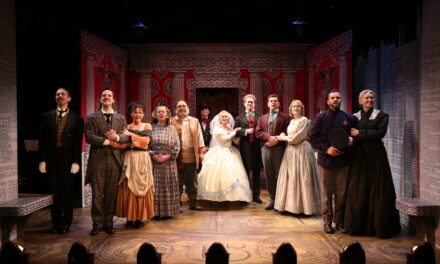by Samuel L. Leiter
I tried hard to count how many dancers appear in Confucius, the visually beautiful, dramatically stultifying dance drama now enjoying a four-performance visit at the David H. Koch Theater. I did this because the 90-minute piece itself gives you very little else to think about as it tells the story of Confucius, described in the subtitle as “teacher, philosopher, man who shaped a nation.” My reaction was much like the title of this review, taken from the master himself: I acknowledge the show’s beauty but I couldn’t always see it.
Performed against an impressive setting (designed and brilliantly lit by Ren Dongsheng) dominated by huge bamboo strips covered with Confucius’s writings, the production resembles an expensive Hallmark greeting card vision of ancient China. Hordes of perfectly coordinated choral dancers swirl about while swathed in designer Yang Donglin’s gorgeous reimaginings of long-sleeved ancient garments, designed with yards of silky, billowing fabric for maximum effect, as prerecorded music (uncredited), now stirringly martial, now lushly romantic, booms forth continuously (and loudly).
The show premiered in Beijing in 2013, a product of the state-supported China National Opera & Dance Drama Theater, and has been presented internationally. Directed and choreographed by Kong Dexin, billed as “a 77th-generation direct descendant of Confucius” (which apparently allows her the longest curtain call), it has a wordless scenario by Liu Chun that dramatizes the difficulties experienced by the title character, who lived during the Zhou Dynasty and died in 479 B.C. Widely revered but sometimes reviled (especially during the Cultural Revolution), Confucius’s ideas on harmony and benevolence continue to resonate in Communist China as a buffer to Western liberalism.
Confucius’s six scene divisions are communicated via video titles (which include a few grammatical errors) on large side screens, but the information (Prelude: Inquiry; Act I: The Chaotic Time; Act II: Out of Food; Act III: Great Harmony: Act IV: Mourning for Benevolence; and Epilogue: Happiness) is less helpful than a fortune cookie message. More substance is provided by the occasional quotes, most of them cryptic, but some familiar, that flash by accompanied by a note on what tome they first appeared in. It’s hard for the uninitiated to know what to do with comments like: “Collapse of etiquette, Loss of benevolence,” or “In the morning hear the way, In the evening die content,” to cite two of the shorter ones. Words like “Incensing,” “Remonstration,” and “Rebellion” occasionally appear to give some idea of what the following scene is about, but essentially you’re on your own (unless you read the program synopsis) in a tale whose telling is largely free of dramatic development, with each scene’s emotional level much the same as the one before and after.
The music—sounding like a big-screen sound track combining Western-style music with Asian touches—supports exceptionally well-performed choreography that is predominantly ballet-based but has many attitudes clearly derived from traditional Chinese theatre. Supplemented by remarkably acrobatic leaps, somersaults, pirouettes, and cartwheels, the abundant physical activity enacts a narrative that fails to clarify who, aside from Confucius (Hu Yang) himself, the other personages are, what they’re doing, or why we should care.
The handful of “characters”—as opposed to swarms of identically costumed concubines, soldiers, courtiers, or peasants—are identified as “Concubine” (Tang Shiyi), “Minister” (Guo Haifeng), Duke (Zhu Yin), “Eunuch” (Xing Yan), and “Confucius’s Apprentices” (Yang Tianyuan, Hou Meng).
Hu Yang’s Confucius is a slender, bearded, dashing hero, with many opportunities to display his athletic virtuosity, including a flamboyant sword dance whose presence even my companion, a Chinese scholar, couldn’t explain. The standout performance is the exceptionally lithe, almost butterfly-like Tang Shiyi, whose ability to spin in place would make any champion figure skater jealous.
I began by saying I occupied some of my time trying to count the performers. Judging by the program, which lists 47, I was off by only one or two. Interestingly, Confucius will be followed at the Koch on January 11 by Shen Yun, a competitor in the world of spectacular dance productions set in ancient China. With its New York-based performers being followers of the persecuted Falun Dafa/Falun Gong movement, it suggests a political as well as artistic rivalry. Hopefully, there will be more to hold one’s interest than visual prettiness and the company’s size.
Photos: Liu Haidong
(originally appeared at)
http://slleiter.blogspot.com/2017/01/117-review-confucius-seen-january-5-2017.html
Confucius
David H. Koch Theater at Lincoln Center
Through January 8
























